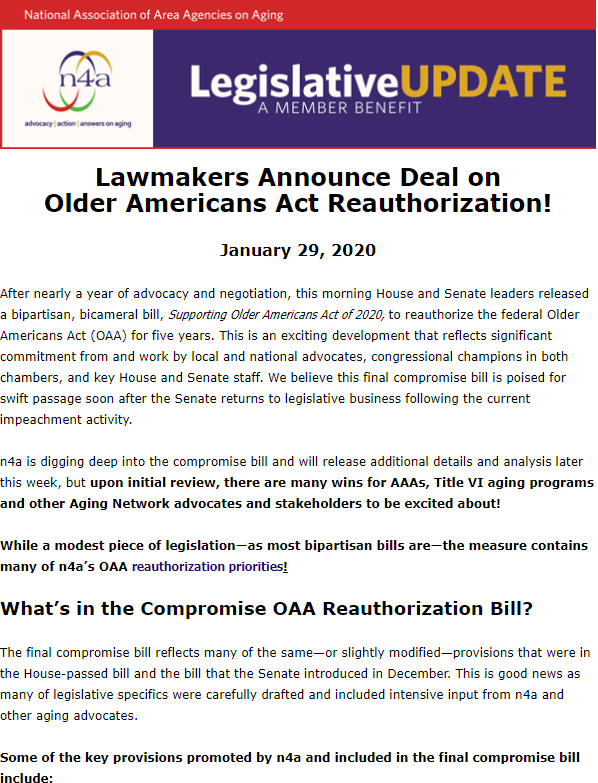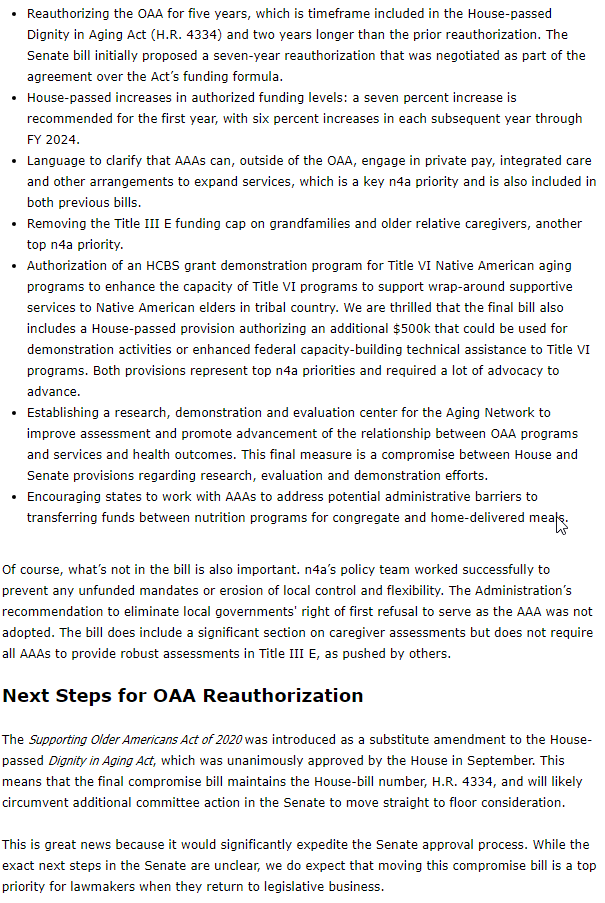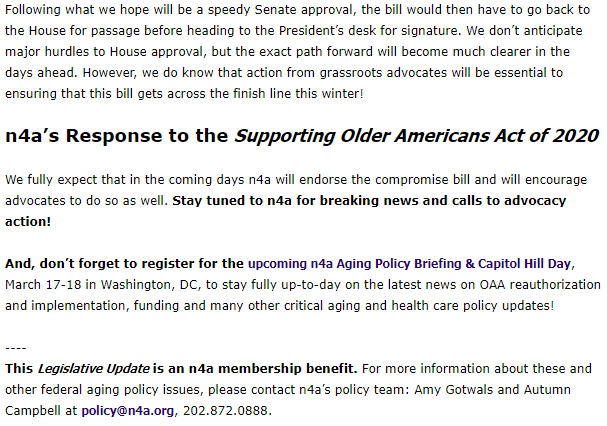N4A UPDATE 01-29-2020




A bill introduced by Senate Finance Committee leaders, Chairman Chuck Grassley (R-IA) and Ranking Member Ron Wyden (D-OR), would provide permanent funding for the Medicaid Money Follows the Person Program (MFP), a longtime n4a legislative priority. This action from the Senate follows a 4.5-year extension of MFP that passed the House earlier this year. Congress will have to pass either another short-term extension or act on a longer-term reauthorization of the program by December 31, which is when current funding expires. With a full slate of legislative priorities to finish this week, Congress is more than pressed for time, so advocates need to get loud NOW on the importance of continuing funding for MFP!
Since 2005, MFP has been instrumental in enabling 91,000 older adults and people with disabilities transition from Medicaid institutional settings to the community. However, the last round of long-term funding for the program expired in 2016. As a result, advocates and lawmakers have been working ever since to promote bipartisan bills in the House and the Senate that would provide additional funding for states to continue rebalancing their Medicaid long-term services and supports (LTSS) programs with MFP. While there have been a series of short-term funding allocations for MFP since 2016, permanent future funding is essential to maintain and expand upon the success of MFP.
Two Easy Ways to Take Action
n4a recently signed on to a national organization letter and is participating in a nationwide advocacy effort this week, and we hope you will join aging and disability advocates in telling your Senators and Representatives why MFP is so important to older adults and people with disabilities living in your community! Use the below talking points, but make sure to personalize your outreach with local facts about MFP—which may not be called MFP in your state—and success stories you can share! Make sure to clarify how MFP benefits older adults and people with disabilities in your community—especially if the program is called something else in your state.
MFP Talking Points
MFP gives people reliant on Medicaid long-term care programs the right to decide where they live and receive home and community-based services. It provides assistance to help older adults and people with disabilities transition out of institutional settings and back to the community.
Since 2005, MFP has assisted more than 91,000 people with moving back to the community and has helped 44 states improve access to HCBS. MFP is a program that helps everyone win: individuals regain their independence, and state and federal governments save taxpayer dollars because it costs less to provide services and supports in the community rather than in an institution.
Congress must act to extend funding for MFP by the end of the year or states will be unable to continue this cost-effective program that promotes independence for older adults and people with disabilities. Please consider supporting and co-sponsoring a permanent extension of this vital program today!
Thank you for your advocacy on this important issue!
---
If you have questions or concerns about this Advocacy Alert or n4a’s policy positions, please contact Autumn Campbell at This email address is being protected from spambots. You need JavaScript enabled to view it. and Amy Gotwals at This email address is being protected from spambots. You need JavaScript enabled to view it..

Don’t Let OAA Reauthorization Stall:
Urge Your Senators to Adopt the House-Passed Bill!
November 13, 2019
Despite recent House action to approve the Dignity in Aging Act (H.R. 4334)—a bipartisan bill to reauthorize the Older Americans Act—time is running short to move a bill through the Senate approval process and onto the President’s desk by the end of 2019! Congress’ remaining days in session are numbered and filled with other pressing matters. Yet n4a believes it’s important to finalize OAA reauthorization before the end of the year, as there are many challenges with moving legislation during a presidential election year.
The best opportunity to see an OAA reauthorization bill signed into law in 2019 is for the Senate to approve the bipartisan House bill, H.R. 4334.
n4a endorsed the Dignity in Aging Act, H.R. 4334, as did dozens of other national aging advocacy organizations. After enthusiastic, unanimous approval in the House on October 28, we believe the most practical path forward is for the Senate to approve this strong reauthorization legislation, sending it to the White House for the President’s signature. Many of the provisions in H.R. 4334 were informed by, and adopted from, provisions that were in the Senate draft bill, circulated in June, which means this process has already been bicameral.
However, engagement from local aging advocates will be essential to getting 2019 OAA reauthorization legislation over the finish line! Contact your Senators TODAY to urge them to bring the House-passed bill to the Senate floor!
Take Action
While we remain optimistic about the prospects for OAA reauthorization, we may lose the current momentum and window of opportunity to reauthorize the Act if the process continues through the holidays and into 2020. To reach the finish line this year, local advocates must act!
---
If you have questions or concerns about this Advocacy Alert or n4a’s policy positions, please contact Autumn Campbell at This email address is being protected from spambots. You need JavaScript enabled to view it. and Amy Gotwals at This email address is being protected from spambots. You need JavaScript enabled to view it..

n4a has breaking news from Capitol Hill! According to leaders on the House Education and Labor Committee, the full House is expected to consider the Committee’s bipartisan bill to reauthorize the Older Americans Act, the Dignity in Aging Act (H.R. 4334), next week—as early as the afternoon of Monday, October 28!
n4a endorses the Dignity in Aging Act as do dozens of other national aging advocacy organizations. We are urging swift passage in the House on Monday and we need your help to make this happen. Time to act is short, but we hope you will take one or more of the following steps to encourage your Representatives to support critical OAA programs!
Take Action
More About the Dignity in Aging Act
The Dignity in Aging Act, H.R. 4334, was introduced in September and sailed through the committee approval process with unanimous support from House Education and Labor Committee members. Importantly, H.R. 4334 is a five-year reauthorization of the OAA and includes critical increases in funding authorization levels. The measure also contains several other n4a-supported priorities including:
What’s not in the bill is also important, as n4a worked successfully to prevent any unfunded mandates and threats to local control and flexibility.
The bill that the full House will consider next week also includes several modest provisions that were originally introduced in the Senate’s draft reauthorization proposal. Furthermore, the Dignity in Aging Act includes a Senate-sponsored funding formula compromise. The federal OAA funding formula and harm-reduction provision within the formula stalled Senate action on OAA reauthorization this summer, but recently Senators reached an agreement and sent their compromise language to the House to include in H.R. 4334. Members recently released the final bill text and summary of the Dignity in Aging Act, which will be on the House floor on Monday.
Next Steps
Across Capitol Hill, the Senate has resolved its months-long funding formula negotiations and resumed bipartisan, bicameral reauthorization discussions. While we still expect that each chamber will consider its own reauthorization proposal, reports of proactive negotiations across the rotunda are great news and bode well for a possible compromise bill arriving fairly soon.
While we are optimistic about the prospects for OAA reauthorization at this point, there is still a lot of advocacy work to do before we reach the finish line! Stay tuned to n4a and continue to educate your Senators and Representatives about the value of OAA programs and services to your community. Thank you for your advocacy on this important issue!
---
If you have questions or concerns about this Advocacy Alert or n4a’s policy positions, please contact Autumn Campbell at This email address is being protected from spambots. You need JavaScript enabled to view it. and Amy Gotwals at This email address is being protected from spambots. You need JavaScript enabled to view it..
ECIAAA
1003 Maple Hill Road
Bloomington, IL 61705-9327
Contact Us
Email: aginginfo@eciaaa.org
Phone: 309-829-2065
Fax: 309-829-6021
Mon-Fri: 8:00 am to 4:00 pm
Sat-Sun: CLOSED